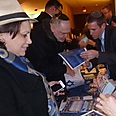

But the Plaza Hotel in central Manhattan appeared to be the biggest Zionist domain – without a hint of cynicism – in the entire universe, as hundreds of religious and secular, young and old Jews filled it with one goal in their minds: To finalize things before heading to the Middle East, at the courtesy of the greatest aliyah enterprise in the West – Nefesh B'Nefesh – in cooperation with the Jewish Agency, KKL-JNF Keren Kayemeth LeIsrael and Israel's Immigrant Absorption Ministry.
In the well-organized event, which included different lectures and stands, the organization presented the Israeli health system and its insurances (which is remarkably different from the American system), employment opportunities, immigrants' rights and residence options.
Meet the new Israelis who are on their way. Who knows, they may become your neighbors, you may have a job offer for them, and perhaps their arrival will just make you fondly remember why you live here.
David Berger, 58: Israel is my last stop
Current place of residence: New York. Profession: Psychologist and teacher. Religious views: Not religious
Berger has already bought a one-way ticket to Tel Aviv, but he came to the fair to learn about employment opportunities, or as he says: "I wanted to know how a New Yorker can get along in Israel.
"Israel is my last stop," he adds. "I'm coming to live in Israel, and when I die I will be buried in Jerusalem. I want to live with my people, in my country. For 2,000 years we had nothing, and now that we have the State of Israel even an 'old man' like me can contribute.
"I have been dreaming of coming to Israel for the past 19 years, but was delayed because of my family situation. Now there is no longer anything tying me to this place."
Tatiana, 42, and Tabitha Gomez, 18: For IDF
Current place of residence: Massachusetts. Our home in Israel: Near Lake Kinneret. Religious views: Not religious
Tatiana and Tabitha were born in Brazil and immigrated to the United States 13 years ago. They feel completely American, but one day everything changed.
"Tabitha initiated this move because she wanted to join the army," says Tatiana, her mother. "We waited for her to finish school. I myself got divorced and wanted to make a change, and as I always had a deep desire to live in Israel, I decided it was time for a new life and a new beginning."
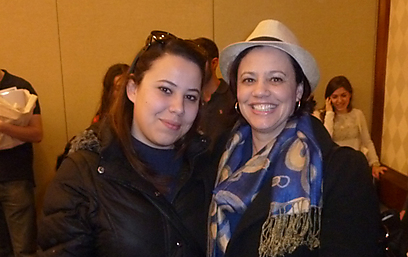
'Time for a new life and a new beginning.' Tatiana and Tabitha
"All my friends are already in Israel," says Tabitha, "and many of them have already been in the army and are already studying. I have always wanted to enlist, I just didn't know if I would serve in the Brazilian, American or Israeli army. Now, after all my friends are already in Israel – it's clear to me that I will also join the IDF."
Miriam and Yosef, 30: Our home is in Israel
Current place of residence: New Jersey. Profession: She works in a law firm, he's a teacher. Our home in Israel: Mitzpe Yericho. Religious views: Ultra-Orthodox
The couple has a daughter and loves life in the US. "But I feel that my home is in Israel," says Miriam.
They came to the fair looking for employment opportunities. "We have many reasons to want to make aliyah – both in order to settle the country and from a social aspect. But it's hard, there's no doubt. Our entire family is here. Life here is great and we like it in the community, but as far as we are concerned it's time to immigrate to Israel."
Moshe, Renee and their kids: Leaving everything
Current place of residence: New Jersey. Profession: He's a doctor who owns two dental clinics, she's a marketing manager . Our home in Israel: Samaria. Religious views: Religious
Moshe and Renee arrived at the fair with their four children – Caleb, Dudu, Hillel and Eliana – with the goal of "making them feel part of the process."
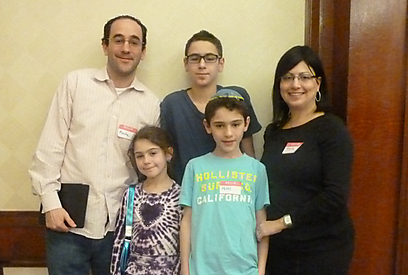
'Israel is the home of the Jews' (Photo: Liron Nagler-Cohen)
"It's something we have thought about for many years," says Moshe. "Israel is the home of the Jews, and it's time to leave the Diaspora. It's convenient for us here at the moment, and we're leaving everything behind.
"It's really 'go from your country, your people and your father’s household.' For us it's basically leaving everything. We have friends in Israel, but no family. But it's important to us because for 2,000 years we couldn't settle on our land, where every Jew seeks to live."
The family informs us that their aliyah is planned for the summer of 2015, after Caleb (who is currently in the 10th grade) graduates and joins the army. The family celebrated Caleb's bar mitzvah in Hebron. After they immigrate, Moshe is planning to work in real estate in Judea and Samaria while maintaining his dental clinics in New Jersey.
Zehava Arky, 27: Haven't told family yet
Current place of residence: Los Angeles. Profession: Psychology student and a teacher. My home in Israel: Deliberating between Jerusalem and Tel Aviv. Religious views: Religious convert
"I was born to a non-Jewish family in Michigan, after we immigrated from Nigeria to the United States," says Arky. "I discovered Judaism only when I was in college, and started taking a deep interest in it. I have been Jewish for five years now, and married for a year and a half."
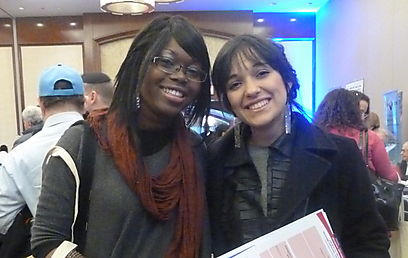
'It's the Jewish state and we all have to live in it.' Zehava Arky (L) and Sara Meira Tovar (Photo: Liron Nagler-Cohen)
Asked why she is immigrating to Israel, Arky responds: "It's the Jewish state, and we all have to live in it. That's the simple answer to our aliyah."
Arky has visited Israel twice before. "I love the Israeli cultural diversity, and I plan to work with refugees or in one of the international aid organizations."
And how did the family react to her decision? "My mother is happy and would have loved to live there herself, even though she is not Jewish, but for my husband's family it will difficult and we haven't told them yet."
Sara Meira Tovar, 27: Survival skills
Current place of residence: New Jersey. Profession: Works in a yeshiva in New Jersey, has a master's degree in international relations. My home in Israel: Katzrin. Religious views: Religious
Tovar, who was born in Colombia, has a daughter. "After seeking a more religious life, I arrived in the United States. I come from a Latin country, which from a cultural aspect at least is more similar to Israel than to the United States. I feel I have more survival skills there."
Rachel Ben-Eli, 23: Passed my aliyah test
Current place of residence: Connecticut. My home in Israel: Haifa. Religious views: Not religious
If you're around, you'll meet Ben-Eli this coming September, ahead of her national service ("because I am too old to enlist, although I really wanted to").
Ben-Eli, whose father is Israeli, spent all her vacations in Israel with her father's family. "When all my friends vacationed in the Caribbean Islands, this was the highlight of my summer."
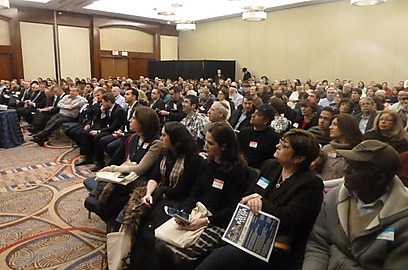
Some 1,000 Jews, 100% Zionism at Nefesh B'Nefesh fair (Photo: Liron Nagler-Cohen)
She studied at Tel Aviv University for half a year, "and I got a hang of the culture in Israel," she says. "Even beforehand I wanted to make aliyah, but this was undoubtedly my aliyah test, which I passed – with flying colors.
"After school, I volunteered in the north and met many people there who later became my friends, and then I had to come back here to complete my degree, but at this stage I already knew I would make aliyah and start my life in Israel."
Ben-Eli says she made her real introduction with Israel as part of the Masa program, which she even worked in it for a year and a half afterwards – "I helped Americans find themselves in Israel."
She says that the program changed her life, "and so I was happy to help others, so they would have those experiences too.
"I want to make aliyah and live like an Israeli, not like an American living in Israel," she says, adding that her parents have mixed emotions over her departure.
"My father has already gone through the experience of separation, transition and emigration when he left for the US. On the other hand, they are excited that I am fulfilling my dream, but none of us has any doubts that it's going to be difficult with me so far away. I hope that once my parents see me getting along, they'll follow in my footsteps and settle there too."
Tovah, 36, and Rabbi Izhar Azriel, 38: Diving in
Current place of residence: Queens, New York. Profession: She's a housewife, he's a community rabbi. Religious views: Religious
The Azriel couple and their four children – aged two to 11 – are about to come to Israel. Very soon, in fact. These are the known facts.
What will they live on? Where will they live? These are just a few marginal unknown facts, or as Tovah says: "I don't like to plan ahead too much, so we're just diving into the deep water.
"We have been married for 12 years now, and since we got married we have been thinking about this move," she adds. "We talk about it all the time. What attracts us? Life there, the people there, the ability not to get caught in external appearances. Life in Israel is much simpler, much more communal, and it has meaning. Here in the US, everyone lives their own life.
"It's also because of the children. Here they have a long school day and they come home later, without quality time with family or friends, without time to really live life, although it's easier here economically. And that really worries us, because my husband is a rabbi and I'm not working at the moment. My husband doesn’t like the politics of the Rabbinate in Israel, so he doesn't want to earn a living from it."
Rabbi Azriel's family lives in Israel, but his wife's family lives in the US. Yet she says, "We miss his large family."
Shlomo Lubitch: Because of Hurricane Sandy
Current place of residence: Queens, New York. Religious views: Religious
Lubitch had everything he wanted until October 2012, when Hurricane Sandy came through the skies of New York and destroyed his life.
"The small Jewish communities here are unlike the communities in Israel," he sighs. "Sandy took its toll. We are a small community living on the sea, and our community was hurt badly. The storm opened our eyes to Israel.
"Houses were ruined and people became homeless. People suddenly saw the transitivity of things. You can have a house worth $5 million on the sea, but that doesn’t mean you'll have the same thing tomorrow. That's one of the reasons we thought about it. Not to mention the fact that you'll never really feel at home here."
Bryan Burns, 24: I hate my job
Current place of residence: New York. Profession: Owner of a packaging company. Religious views: Traditional
A moment before he leaves everything, closes his business and starts studying for a degree in Israel – Burns clarifies that he just doesn't like it in the US. Uncommonly, he says he experienced anti-Semitism throughout his life.
"I thought about it for two years, and one night I discovered that I hate my job and I'm mature enough to leave," he says.
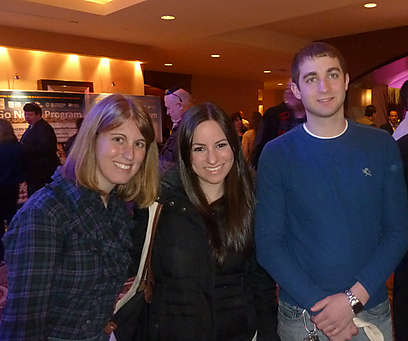
'I've always felt like a foreigner here.' Bryan Burns with Rachel Levinson and Beth Magen (Photo: Liron Nagler-Cohen)
"I've always felt like a foreigner here. I've always been treated as a 'Jew.' I've experienced anti-Semitism throughout my life. I've been treated according to my faith and not according to who I am. It's infrequent, but it's there.
"I feel I am very lucky to have been born in a time when the Jewish state exists and it is possible to serve in the army," he says. "It's a situation that wasn't here 2,000 years ago, and it's very exciting. I also think that you can't be completely Jewish and express your Jewishness until you're in Israel. It's also easier for me, as a person who keeps kosher and observes Shabbat and who wants a Jewish education for his children."
Rachel Levinson, 25: To be part of a majority
Current place of residence: New York. Profession: Marketing and advertising. Religious views: Modern Orthodox
"I was in Bnei Akiva camps all my life. Half a year ago it matured into a real thought, and in December I made the final decision," says Levinson.
"I want to live in a place where people will call me Racheli and not Rachel. Here I'm not part of a majority, and I want to be part of a majority. The fact that I am single is also a major consideration."
Myriam, 67, and Prof. Ephraim Sudit, 69: After daughter
Current place of residence: New Jersey. Profession: He is a professor of business administration. Religious views: Not religious
Almost 40 years have passed since Prof. Sudit left Israel as an MA student and went to study in the US. The master's turned into a PhD, his marital status changed too, and the convenient "temporary apartment" slowly turned into the Sudit family's home, "and as the years go by, the likelihood to come back drops because there are many reasons to stay."
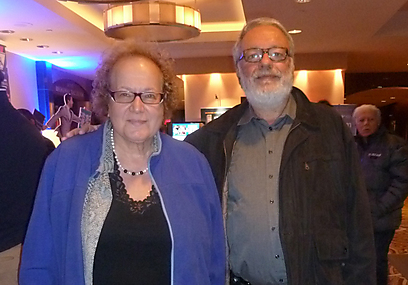
'Socially, even if there are many people you know here, there is a certain detachment.' Myriam and Ephraim Sudit (Photo: Liron Nagler-Cohen)
One of the main reasons was Sudit's work as a professor for business administration at Rutgers University, the largest institution for higher education in New Jersey. And all that time Ephraim maintained an Israeli connection as much as he could: The family surrounded itself with Israeli friends and spoke Hebrew, "so the connection to the language was not cut off."
Until one day, the couple's only daughter, 23, announced that she was immigrating to Israel. "She always felt connected to Israel," Prof. Sudit says, "and even studied for two semesters at a high school for foreign students in Tel Aviv."
After serving in a volunteers' program in the IDF, the girl informed her parents that she had decided to immigrate to Israel, "and that will likely be the last push for us," her father says.
"Economically it's more convenient here, and there are more opportunities because it's a large country, but socially – even if there are many people you know here – there is a certain detachment," he says.
"We are still tied to what is happening in Israel. It's easy for us to identify with what is happening there, much more than with what is happening here, in a large country like the United States.
"And although we are returning at an old age, if we're in good health we can volunteer in the fields we can contribute in, and that looks like an excellent opportunity which attracts us."
Nefesh B'Nefesh: No greater Zionism
"Such an event, in which more than 1,000 Diaspora Jews gathered to hear and learn about their options for making aliyah is proof that the concept of Zionism in the lexicon of the Diaspora Jewry is alive and well," says Nefesh B'Nefesh Vice Chairman Erez Halfon.
"In an event in the heart of Manhattan you see a hall teeming with people of all ages and all sectors, who have gathered for one clear goal: To immigrate to the State of Israel. There is no greater Zionism than this."
"It's an idealistic, purely ideological, aliyah, which is not economically motivated," says Rafael Cohen, the Jewish Agency's representative in the East Coast and one of those responsible for aliyah from Washington and northward. "There is a very small rate of people who make aliyah out of distress, thinking that life in Israel will be better.
"Sixty-seven percent of the immigrants we work with in the East Coast are aged zero to 34," he reveals. "Seventy percent of them come from families of academics, 64% are religious, but among the youngsters – most are secular."
He says the young people arrive as part of programs like Masa, fall in love with the country and stay, or serve in the IDF, and sometimes even bring their parents along.
"The moment they reach the age of 35, it's hard to leave," he says, adding that this is a process of many years, "because they want to know exactly what they're in for."
According to Cohen, "The most assimilating population in the United States is that of former Israelis. They live outside the local Jewish community, and the Agency has made a decision in principle to work with them in order to help them strengthen their Jewish identity."















